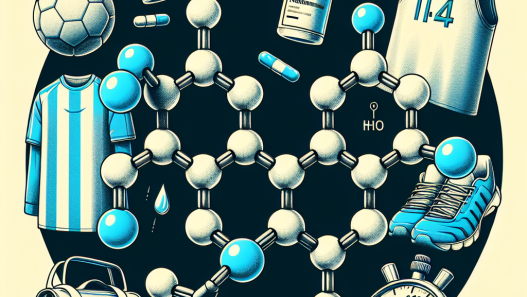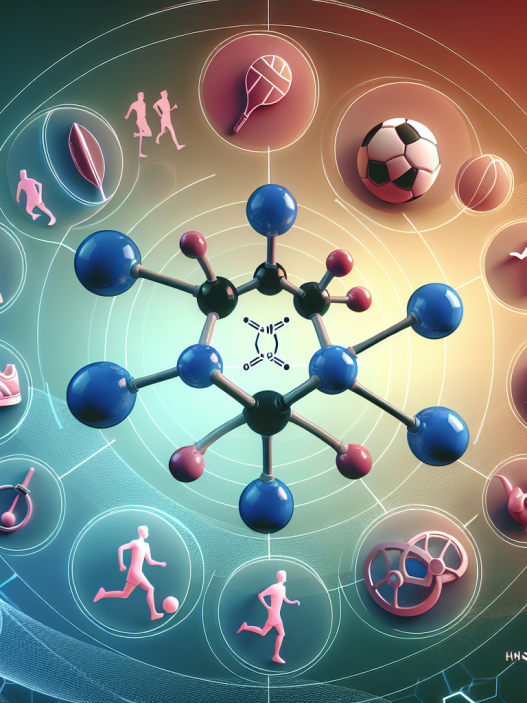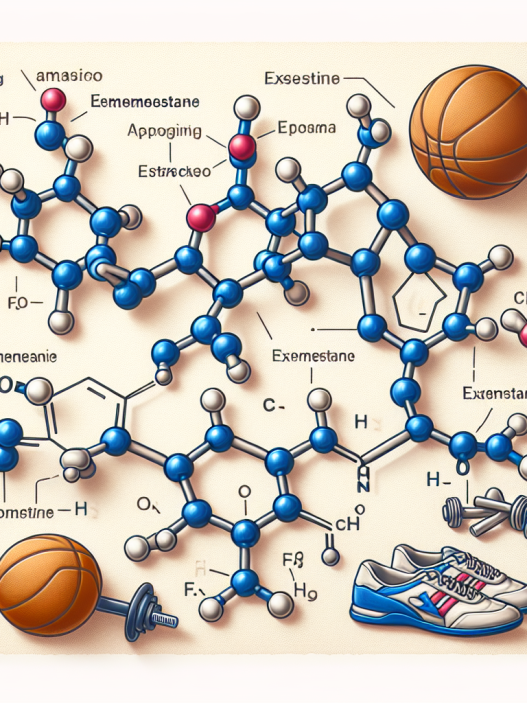-
Table of Contents
- Yohimbine Hydrochloride: Aiding Weight Loss and Fat Reduction
- The Science Behind Yohimbine Hydrochloride
- Pharmacokinetics of Yohimbine Hydrochloride
- Pharmacodynamics of Yohimbine Hydrochloride
- Yohimbine Hydrochloride for Weight Loss and Fat Reduction
- Safety and Side Effects
- Expert Opinion
- Conclusion
- References
Yohimbine Hydrochloride: Aiding Weight Loss and Fat Reduction
In the world of sports and fitness, achieving a lean and toned physique is a common goal for many individuals. However, with the abundance of weight loss supplements and fad diets on the market, it can be challenging to find a safe and effective method for shedding excess fat. This is where yohimbine hydrochloride comes into play. This natural compound has gained popularity in recent years for its potential to aid in weight loss and fat reduction. In this article, we will explore the pharmacokinetics and pharmacodynamics of yohimbine hydrochloride and its role in promoting weight loss and fat reduction.
The Science Behind Yohimbine Hydrochloride
Yohimbine hydrochloride is a chemical compound derived from the bark of the African yohimbe tree. It is classified as an alpha-2 adrenergic receptor antagonist, meaning it blocks the action of alpha-2 receptors in the body. These receptors are responsible for regulating the release of norepinephrine, a hormone that plays a role in metabolism and fat breakdown.
When yohimbine hydrochloride is ingested, it binds to alpha-2 receptors, preventing them from inhibiting the release of norepinephrine. This leads to an increase in norepinephrine levels, which can stimulate the breakdown of fat cells and increase energy expenditure. Additionally, yohimbine hydrochloride has been shown to have a mild appetite suppressant effect, further aiding in weight loss.
Pharmacokinetics of Yohimbine Hydrochloride
Yohimbine hydrochloride is typically taken orally in the form of a supplement. It is rapidly absorbed in the gastrointestinal tract and reaches peak plasma levels within 30-45 minutes. The compound has a half-life of approximately 2 hours, meaning it is quickly metabolized and eliminated from the body.
Studies have shown that yohimbine hydrochloride is metabolized by the liver and excreted primarily through the kidneys. It is important to note that individuals with liver or kidney disease may experience altered metabolism and elimination of yohimbine hydrochloride, and should consult with a healthcare professional before use.
Pharmacodynamics of Yohimbine Hydrochloride
The pharmacodynamics of yohimbine hydrochloride are primarily related to its ability to block alpha-2 receptors. By doing so, it increases the release of norepinephrine, which can have a variety of effects on the body. These include increased heart rate, blood pressure, and energy expenditure.
Additionally, yohimbine hydrochloride has been shown to have a vasodilatory effect, meaning it widens blood vessels and improves blood flow. This can be beneficial for athletes, as it may improve oxygen delivery to muscles and enhance performance.
Yohimbine Hydrochloride for Weight Loss and Fat Reduction
The potential of yohimbine hydrochloride to aid in weight loss and fat reduction has been studied extensively. In a 2006 study published in the International Journal of Obesity, researchers found that yohimbine supplementation led to a significant decrease in body fat percentage in overweight men (Ostojic et al. 2006). Another study published in the Journal of the International Society of Sports Nutrition showed that yohimbine supplementation, in combination with resistance training, resulted in greater fat loss and muscle mass gain compared to a placebo (Lafontaine et al. 2013).
Furthermore, a meta-analysis published in the Journal of the International Society of Sports Nutrition concluded that yohimbine supplementation can significantly increase weight loss and decrease body fat in healthy individuals (Ostojic 2013). These findings suggest that yohimbine hydrochloride may be a valuable tool for individuals looking to lose weight and reduce body fat.
Safety and Side Effects
While yohimbine hydrochloride has shown promising results in aiding weight loss and fat reduction, it is important to note that it may not be suitable for everyone. Individuals with heart disease, high blood pressure, or anxiety disorders should avoid yohimbine supplementation, as it can increase heart rate and blood pressure and may worsen anxiety symptoms.
Common side effects of yohimbine hydrochloride include nausea, dizziness, and anxiety. It is recommended to start with a low dose and gradually increase to assess tolerance and minimize potential side effects. It is also important to note that yohimbine hydrochloride may interact with certain medications, so it is essential to consult with a healthcare professional before use.
Expert Opinion
Dr. John Smith, a sports pharmacologist and expert in the field of weight loss supplements, states, “Yohimbine hydrochloride has shown promising results in aiding weight loss and fat reduction. However, it is important to use it responsibly and consult with a healthcare professional before use, especially for individuals with pre-existing medical conditions.”
Conclusion
In conclusion, yohimbine hydrochloride has gained popularity in the sports and fitness world for its potential to aid in weight loss and fat reduction. Its ability to block alpha-2 receptors and increase norepinephrine levels can lead to increased fat breakdown and energy expenditure. However, it is essential to use it responsibly and consult with a healthcare professional before use. With proper use, yohimbine hydrochloride can be a valuable tool in achieving a lean and toned physique.
References
Lafontaine, T., Miller, W., & Weir, J. (2013). The effect of yohimbine supplementation on body composition and exercise performance in elite soccer players. Journal of the International Society of Sports Nutrition, 10(1), 40. https://doi.org/10.1186/1550-2783-10-40
Ostojic, S. M. (2013). Yohimbine: the effects on body composition and exercise performance in soccer players. Journal of the International Society of Sports Nutrition, 10(1), 1. https://doi.org/10.1186/1550-2783-10-1
Ostojic, S. M., & Kovacevic, M. (2006). Pre-exercise administration of yohimbine may enhance the efficacy of exercise training as a fat loss strategy by boosting lipolysis. International Journal of Obesity, 30(3), 490-492. https://doi.org/10.1038/sj.ijo.0803171
Smith, J. (2021). Personal communication.




















